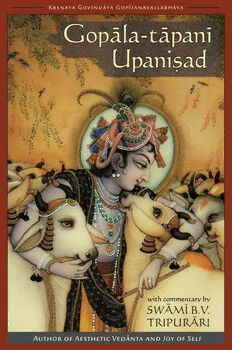
Gopala-tapani Upanisad (Upanishad) PDF
Preview Gopala-tapani Upanisad (Upanishad)
K®ß√aya Govindåya Gopîjanavallabhåya GG GGooppåållaa--ttååppaann¡¡ oo pp åå UUppaanniißßaadd ll aa -- Gopåla-tåpanî Upanißad is one of the tt principal 108 Upanißads. It emphasizes åå The Upanis.ads inform us that we should move from pp Gopåla K®ß√a and the spiritual practice aa by which this feature of the divine can mortality to immortality. However, Gopåla-tåpanî Upanißad takes nn us further still, from immortality to the nectar of immortality. It be realized. Gopåla K®ß√a represents the ¡¡ speaks to us of an experience of immortality that is both positive and heart of the Absolute and is thus real- UU progressive. Rather than an experience of immortality that involves ized by the exercise of the practitioner’s only the cessation of mortality, retiring the soul in eternal passivity, pp heart: from dutiful devotion to love itself. the passages of Gopåla-tåpanî underscore the potential of the soul aa Within the narratives that this Upa- nn to experience divine play in a realm where reason fi nds dignity not nißad employs to reveal its esoteric doc- ii merely in suppressing sensual passions but, more so, in bowing to ßß trine, the very fi gure of love personifi ed divine passion. (cid:2)(cid:2)Although K®ß√a’s divine play is the ideal of Gopåla- aa Swami B. V. Tripurari resides in his appears along with love’s object. The per- tåpanî, being an Upanißad, the text is true to its genre and therefore dd monastery, Audarya, in the redwoods of fect object of love, K®ß√a, while nondual, sober. It stresses the discipline of freedom—the mantra—and its fruit, northern California. Author and spiritual is not alone. He appears with the milk- the music that sets God in motion. As Nietzsche would have it, so too teacher, Swåmî has written several books, maid Gåndharvî, identifi ed elsewhere in does Gopåla-tåpanî: freedom is disciplined in that it is a product of a including Rasa: Love Relationships in S sacred Hindu lore as Rådhå. She is his very long period of constraining oneself. Where Gopåla-tåpanî differs, W Transcendence, Ancient Wisdom for Modern primary çakti. As the principle of sacri- of course, is that its eternity is not a euphemism for death. It is the A Ignorance, Tattva-sandarbha: Sacred India’s fi ce, self-giving, and love, she exemplifi es doorway to a land beyond time through which one enters to participate M Philosophy of Ecstasy, Joy of Self, Aesthetic the means to unlock the mystery of life. in God’s play, where God, believe it or not, has become a dancer. I Vedånta: the Sacred Path of Passionate Love, Apply yourself in the discipline of Gopåla-tåpanî, the yoga of B In the later section of the book, this lead- Çrî Guru-Paramparå, Form of Beauty, and devotion that sheds light (tåpanî) on the cowherd K®ß√a (Gopåla), . V ing lady questions sage Durvåså, draw- Bhagavad-gîtå: Its Feeling and Philosophy. and learn to love like you could never have imagined or reasoned was . ing out insight into the cowherd K®ß√a. T possible. This eternal text of revelation descends from a land of love Swåmî B. V. Tripuråri’s commentary R far beyond the reach of the mind—where words cannot reach—and I is deeply perceptive. It draws tastefully P thus about which we cannot say enough. U on much older Sanskrit commentaries R penned by saints of Swåmî’s own lin- A with commentary by eage and, in doing so, serves to further R establish him not only as a contempo- I SWAMI B.V. rary voice of devotional Vedånta but TRIPURARI as a person of both wisdom and heart. Audarya Press Author of Aesthetic Vedånta and Joy of Self Gopåla-tåpanî Upanißad GaaePaal/TaaPaNaqYaaePaiNazd( Gopåla-tåpanî Upanißad SWÅMÎ B. V. TRIPURÅRI OTHER BOOKS BY SWÅMÎ B. V. TRIPURÅRI Bhagavad-Gîtå: Its Feeling and Philosophy Rasa: Love Relationships in Transcendence Ancient Wisdom for Modern Ignorance Tattva-sandarbha Joy of Self Aesthetic Vedånta Çrî Guru-Paramparå Form of Beauty For philosophical inquiries contact: Audarya 22001 Panorama Way Philo, ca 95466 e-mail: [email protected] website: www.swami.org © Swåmî B. V. Tripuråri 2003 All rights reserved. No part of this publication may be reproduced, stored in a retriev- al system, or transmitted in any form or by any means, electronic, mechanical, photo- copying, recording, or otherwise, without prior written permission of the publisher. isbn 1-88606069-53-0 To my gurus, Çrîla A.C. Bhaktivedanta Swami Prabhupåda and Pujyapada Bhakti Rakßaka Çrîdhara Deva Goswåmî. contents ix preface xi introduction 1 pürva-tåpanî 91 uttara-tåpanî
